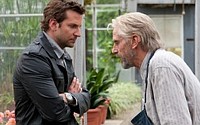
prd Michael Benaroya, Tatiana Kelly, Jim Young
with Bradley Cooper, Jeremy Irons, Dennis Quaid, Zoe Saldana, Olivia Wilde, Ben Barnes, Nora Arnezeder, JK Simmons, Zeljko Ivanek, Ron Rifkin, John Hannah, Michael McKean
release US 7.Sep.13, UK 19.Apr.13
12/US 1h42

Who's life is it anyway: Cooper and Irons



 A story within a story within a story, this film isn't hugely original, but its intriguing themes hold our interest. And terrific performances help us identify with the characters. But the matryoshka doll structure keeps us from properly sympathising with anyone, and the cliche-ridden script never brings it all together.
A story within a story within a story, this film isn't hugely original, but its intriguing themes hold our interest. And terrific performances help us identify with the characters. But the matryoshka doll structure keeps us from properly sympathising with anyone, and the cliche-ridden script never brings it all together.
The tale is told by Clay (Quaid), an author reading his book The Words in a lecture theatre, tracing the story of writer Rory (Cooper) and his wife Dora (Saldana), who moved to New York and struggled for five years before his first novel was published, catapulting him into award-winning, best-selling status. But in the shadows, an old man (Irons) has the key to unravelling their life. Because while they were honeymooning in Paris, Rory found a vintage briefcase, and inside it he discovered a manuscript that he plagiarised.
Filmmakers Klugman and Sternthal are exploring the brutality of the publishing world, in which even the most talented writers fight to make a living. The layered storytelling approach adds several clever angles, but it removes us from each narrative, because Rory and Dora are just fictional characters. So the way Rory passes off these found words as his own feels like a contrived lapse of integrity, no matter how guilty he feels about it later.
Cooper plays the role beautifully, giving Rory a sympathetic haunted quality. And Quaid is excellent as the cocky man who's inebriated with the exuberance of his own verbosity. But it's Irons who gets the best moments, catching us off-guard with moments of steeliness as he tells his own story, which involves yet another extended fictitious flashback to wartime Europe when he was a younger man (Barnes) married to a French waitress (Arnezeder).
The film is skilfully shot, but never particularly telling beyond the inner life that the actors bring to their roles. Intriguingly, the story refers explicitly and obliquely to Ernest Hemingway, whose wife notoriously lost a briefcase of his manuscripts in a Paris train station. But Clay's framing story is the weakest element, centring on squirm-inducing flirtation between a sleazy middle-aged man and a too-young fan (Wilde). The 1940s Paris story is shamelessly romanticised. And the dragged-out conclusion of Rory's odyssey feels ramped up for cinematic effect. All of which makes us feel like we've been manipulated.
 |
themes, language | 15.Apr.13 |

 Still waiting for your comments ... don't be shy.
Still waiting for your comments ... don't be shy.
HOME | REVIEWS | NEWS | FESTIVAL | AWARDS | Q&A | ABOUT | TALKBACK